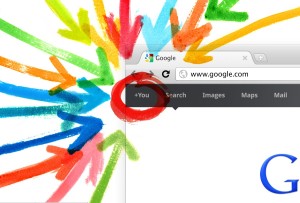There’s No Longer a Plus to Google Social Media

Image courtesy of: http://www.wired.com/2011/07/epicenter_googleplus_music/
The brute force Google+ sign-up of 100’s of millions of YouTube, Gmail, and Google users was the social media equivalent of foisting a shitty U2 album on iPhone users everywhere…
…but with much greater stakes for all parties.
It was also indicative of the way that Google Inc. had operated its online networking program from it’s first proposed origins: stunning in it’s lack of either grace or precision.
Back in 2011, witnessing this messy roll-out, I predicted a swift demise for Google+. I did so in the week of its public launch. So did a lot of folks who understood the habits of social media users. This week, four painful years later, the official eulogies have started pouring in.
The problem, as I saw it, was simple: 100’s of millions of users were not going to move from one social media platform to another without just cause — and with having to learn a new platform and re-find their existing contacts a perceived chore, this “cause” would have had to be massive.
Note to Google: People are lazy. This is why you exist.
And even when Google forced all of its users to sign up — a captive audience of most of the computing world — it still couldn’t get anyone to actually use it’s cloned social networking tools. Quite simply, you can’t force people to “hang out.”
Finally, there was the issue of Google having too many fingers in one pie. Your pie. Your sweet, juicy privacy pie, that is. The one you didn’t particularly want to share.
Sure, all social networks were/are spying on us. To them, we all represent precious data to mine and valuable direct marketing to sell. Everyone (at least kind of ) knows that. Google, however, forgot to be subtle about it. If you watched a YouTube video, they wanted to ensure that you did it through your Google account. If you either posted or looked at a private picture on Picassa, they wanted to be sure that you were logged in to G+ at the time. Searching for a topical cream for that rash on your sensitive parts? All the better when signed into the GoogleCorp.
Grouping all of your online activity into one single monitored account was a tad too obvious a means of intelligence gathering — and, for many, beyond the pale for a business that was, first and foremost, a wholesaler of information.
At least Facebook pretended that they were there to bring people together.
For me, it boiled down to simple biomechanics: It was impossible to type onto a social media platform with my middle fingers being flashed at the screen — which happened every time Google tried to wedge its way into my day-to-day computing life.
Farewell, Google+. I’ll miss kicking you around.
But not hanging out.
